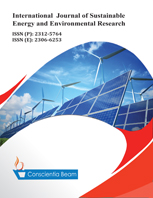Political Economy and Stakeholder Perspectives on Inclusive Low-Carbon Energy Transition: Case of Kenyan Rangelands
DOI:
https://doi.org/10.18488/journal.13.2018.71.35.43Abstract
Kenya, among other developing countries, is challenged by low access to clean power, particularly among households located in remote rangelands of the country. This study sought to evaluate the role and perspectives of energy sector actors in the transition of low-carbon off-grid technologies to households in Kenya as an alternative to the national grid for powering isolated low-income communities. To this end a key informant survey was conducted, involving State and non-state energy sector actors to assess the level of capacity, policy inclusiveness, constraints and delivery of clean off-grid energy technologies to rural households. Key findings revealed that County Government and non-state actors are largely excluded from clean energy planning for off-grid communities. In addition, women, within the framework of women’s groups are strong players in this sector and have a high potential to expand clean energy access to off-grid areas. It was also found that despite the Kenyan Government commitment towards a green economy, a change in policy direction would be necessary to ensure a multi-stakeholder planning approach for increased private investment and inclusive access to clean energy.

